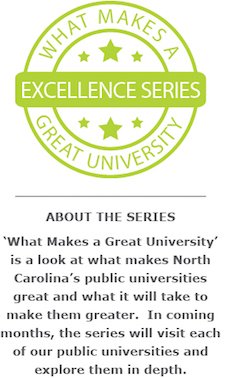 DURHAM – If a smart student on Ocracoke wants to take Honors Physics, odds are her high school won’t have enough students to offer it.
DURHAM – If a smart student on Ocracoke wants to take Honors Physics, odds are her high school won’t have enough students to offer it.
But the North Carolina School of Science and Mathematics in Durham can make it happen.
The School of Science and Math was the first residential school of its kind in the country – but it’s also been a leader in distance education, reaching 700 additional students a year who are literally scattered across North Carolina from Murphy to Manteo.
Not every qualified student can travel to Durham, so the school offers both online courses and interactive video conferencing courses, which link students from high schools across the state in a live virtual classroom with each other and an instructor at the School of Science and Math.
“Many schools in the state might not be able to offer certain courses, AP courses, high-level STEM courses, because they might not have enough students to take them or just can’t afford to do it,” NCSSM Chancellor Todd Roberts says in the accompanying video.
“Our teacher teaches out of the studio and might have three or five students from a school and we combine three to five students from five or six schools into a classroom, so this is a virtual classroom that our teacher is teaching,” Roberts says.
“These are ways that we meet students and schools where they are across the state of North Carolina,” says Jamie Lathan, the Dean of Distance Education at NCSSM.
“Some of the courses that we’re able to offer are courses that the student would not otherwise have access to – courses like Honors Aerospace Engineering, Honors Genetics and Biotechnology, Honors Forensic Science, Honors African-American Studies.”
A separate program offers classes online to students who take anywhere from one to three classes at the School of Science and Math each semester while remaining at their hometown schools. NCSSM Online serves more than 360 students a year as part of this two-year, sequenced program.
Access to high-speed Internet service is so sparse in some parts of the state, though, that some students go to the public library – or even McDonald’s – to take their classes.
Lathan notes that of 311 students in the Interactive Video Conference program, more than 55% are from rural counties and another 20% are from economically disadvantaged counties.
“This is really our way to say everybody in the state deserves a high-quality education,” Lathan says. “Our students in our online program are from 78 different counties across the state, and about 15% of those students are underrepresented minorities.
“This year, I have two students in Murphy in Cherokee County. And I have students in Pasquotank County. And I know that we’ve had students in Ocracoke. Yes, we are meeting the needs of students … in Manteo and Ocracoke and Murphy and Roanoke Rapids and Duplin County Schools, many of the students exposed to the rigorous content for the first time.
“So with that, it’s a shared experience where the students are learning from each other and learning with each other. And that, I think, gives them that boost as they head off to college,” Lathan says.
“Part of the mission of the NC School of Science and Math is to advance education across the state of North Carolina. And distance education is one of the major ways we do that.”

Leave a Reply